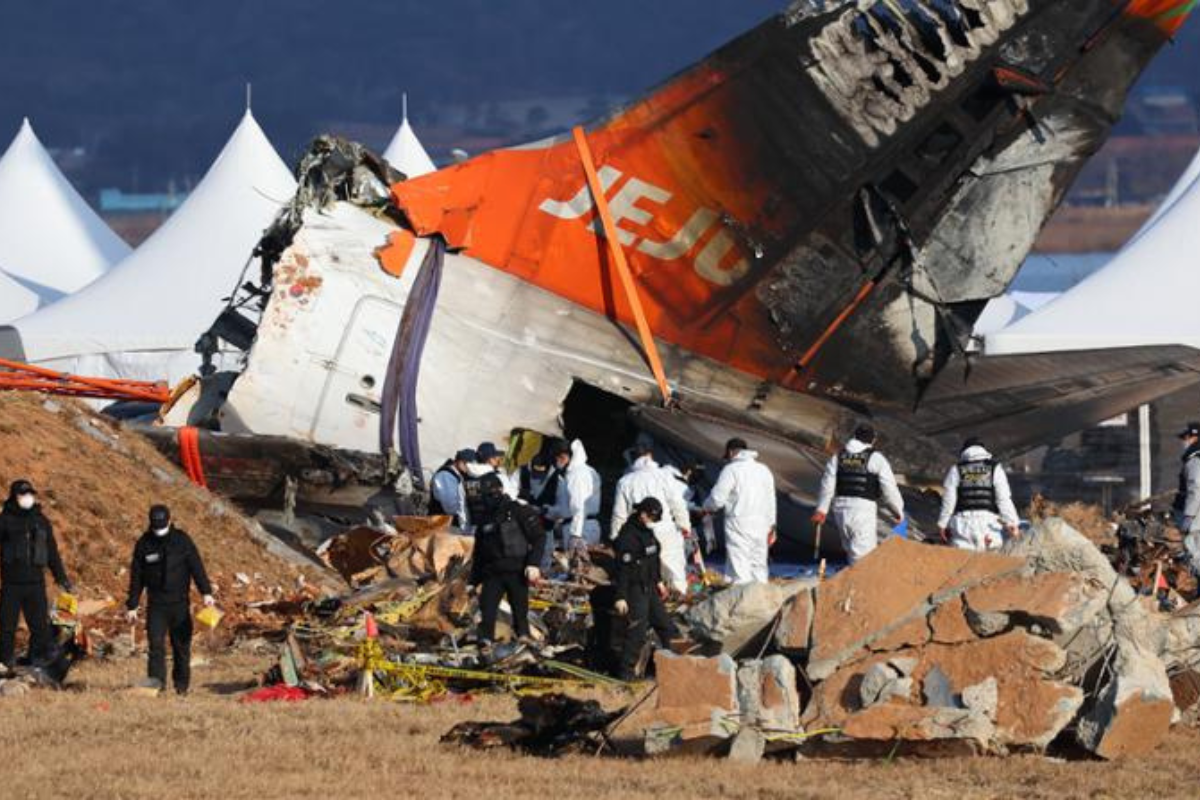
Vital evidence into the crash of Jeju Air flight 7C-2216 on December 29 at Maun International Airport in South Jeolla Province, South Korea, may have been lost after both black boxes on the Boeing 737 stopped recording four minutes before the plane exploded into a ball of flames.
South Korea’s Yonhap news agency reported on Saturday that an analysis of the flight data recorder and the cockpit voice recorder had found that both devices stopped recording at around 8:59 am.
This is the same time that the pilots of the ill-fated flight were informed of a bird strike to the starboard engine, which may have cut off power to the entire plane.
The two black boxes had initially been analyzed in South Korea but when investigators couldn’t retrieve the last four minutes of the flight, the devices were sent to the National Transportation Safety Board (NTSB) in the United States, where experts could still not retrieve the missing data.
What are the ‘black box’ recorders?
Although they are called black boxes, the flight data and cockpit voice recorders are actually a bright shade of orange – designed to make it easier for accident investigators to locate and retrieve these devices.
The Flight Data Recorder (FDR) captures a treasure trove of essential flight data that might help accident investigators determine the cause of a crash, such as altitude, airspeed, heading, throttle settings, and engine performance. The FDR also records all of the control inputs of the pilots, such as their use of rudders and elevators.

Meanwhile, the Cockpit Voice Recorder (CDR) is a separate device that, as the name suggests, records any kind of voice activity in the cockpit, including crew conversations, radio communications, and any warning sounds that might give investigators clues as to what was happening on the flight deck before an accident.
Many countries mandate that CDRs record for at least 25 hours before being overwritten, but in the United States, CDRs currently record for just two hours before being overwritten with new data.
The Federal Aviation Administration (FAA) wants to increase the recording time in line with international standards, but the agency faces force opposition from pilot’s unions who claim a longer recording timeframe would be a breach of their privacy.
Air traffic controllers had warned of bird activity around the airport as the pilots were on their final approach. The pilots attempted to perform a so-called ‘go-around,’ but shortly after, an apparent bird strike to one of the plane’s two engines was caught on camera.
Moments later, the pilots declared a mayday and attempted to perform an emergency landing. For reasons still to be determined, the pilots attempted to land the aircraft without the landing gears deployed.
The aircraft slid along the runway before impacting a hard mound at the very end of the airport, where it exploded. Of the 175 passengers and six crew members onboard, only two flight attendants sat at the very rear of the aircraft survived the accident.
Investigators suspect that the bird strike disabled both engines, cutting off power to the 15-year-old plane. This particular airframe did not have an auxiliary power source, and the black box recorders did not have their own backup power.
Related
Mateusz Maszczynski honed his skills as an international flight attendant at the most prominent airline in the Middle East and has been flying ever since... most recently for a well known European airline. Matt is passionate about the aviation industry and has become an expert in passenger experience and human-centric stories. Always keeping an ear close to the ground, Matt's industry insights, analysis and news coverage is frequently relied upon by some of the biggest names in journalism.








How cheeky and self-serving. Concerned with “their privacy,” more than aviation safety. For shame.
“…particular airframe did not have an auxiliary power source” is rather odd since I have taught both the 737 and 777 aircraft. Unless it was removed, the 737 does have an APU that will power the CVR & data recorder. Something is fishy here. The late comedian, Bob Newhart, had a bit called “The Mrs. Grace L. Ferguson Airline and Storm Door Company” where the passenger would go into the restroom to weigh their baggage and the tickets were cheap because the airline did away “with frills and extras…like radar and maintenance”. Way too many of these foreign (and I dare say some US LCCs do away with “frills and extras” to the detriment of safety. And then there’s an airline that forgets to replace outdated batteries in the “pingers”. That jet has never been found!
No auxiliary Power Source? This particular airplane.? Totally incompetent story.
I pulled out my B 737-300 manual to review systems, and the following remarks, based on 7,000 hours on the -300 and -500, assume that the basic architecture has not changed. The APU needs to be running to provide electrical power. It takes a few minutes to run through the start sequence and put the APU online to provide electric power. In this situation, the pilots were presumably fully occupied just flying the aircraft. If it had been successfully started, the APU could have been used to power the standby hydraulic pump, which could have been used to lower the gear. There is also a way to let the gear free fall without hydraulic power. To accomplish some or all of these actions, the pilots would have needed time, and with double engine failure, they did not have enough time. All emergency procedures/checklists/QRH assume that one engine is still running.
Poorly researched fact. No auxiliary power? I doubt that.